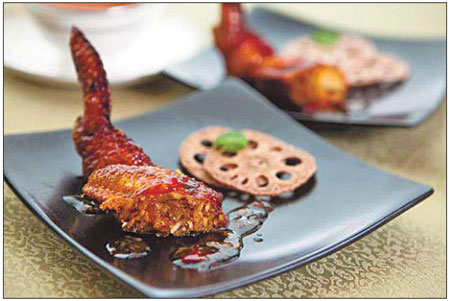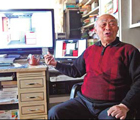Delicacies
Star grazing
By Rebecca Lo (China Daily)
Updated: 2011-02-13 08:18
 |
Large Medium Small |

|
It's all about the presentation on the plate when traditional Chinese cuisine woos Michelin stars. Photo Provided to China Daily |
|
Above: Hong Kong's Michelin chefs are pulling out all stops as they draw on traditional concepts of "color, fragrance and taste" to impress diners, and win top ratings. Photos Provided to China Daily |
On a chilly Friday evening in Mong Kok, the spacious open dining room of Ming Court in the Langham Place Hotel is buzzing. Packed with diners bidding farewell to the Year of the Tiger, every table is full. Elegantly clad wait staff deftly divvy up the restaurant's award-winning deep fried lobster with cheese and abalone, while sommelier Zachary Yu hovers with suggestions for pairing the dish with Ming Court's latest trove of WillaKenzie Estate wines from Oregon.
Executive chef Tsang Chiu King is a flurry of motion within the kitchen. He is putting the finishing touches on a sweet and savory pudding concoction with diced Wagyu beef in chocolate sauce while keeping pace with the rapid-fire orders that comes all in a day's work for the veteran Cantonese chef.
Ming Court's sophisticated and innovative menu gives Cantonese food a whole new spin - and it is no wonder the restaurant was honored with two stars in the latest Michelin guide to the best restaurants in Hong Kong and Macao.
The 2011 edition is the guide's third installment for the sister special administrative regions. When it was first introduced, there was much grumbling among local foodies as it was Michelin's first foray into ranking the kitchens of a Chinese city. Critics panned its credibility and doubted the Michelin inspectors' ability to judge real Chinese cuisine.
Indeed, the guide had only expanded beyond its European base to New York in 2005, then Tokyo in 2007. Its next destination will be the first edition rating Taiwan's dining scene, to be launched in March.
With a shortlist of primarily Western food inspectors conducting anonymous reviews, the accuracy of Michelin's ratings has been hotly debated ever since it was first introduced in 2009. How can non-Chinese reviewers know what is truly delicious to the Chinese palate?
The most jaded among the skeptics argued that Michelin should stick to manufacturing tires.
"People in Hong Kong may not take the Guide seriously, but restaurateurs all do," insists Alvin Leung, Bo Innovation's self-styled "demon chef".
Bo Innovation's extreme cuisine - an eclectic revamp of traditional Cantonese favorites that is part science experiment and part divine inspiration - was one of the surprise entries with one star in the first edition.
Currently, the self-taught engineer-turned-chef is going full steam ahead with plans for a cookbook and a London branch of Bo Innovation. There are also preliminary talks with Malaysian television stations for a cooking show.
"The Michelin guide is an information center," says Leung. "It is an international guide with international standards. The best thing about it is that it gives everyone a kick in the ass. While I've lost a star, others have gained one. It puts everyone on their toes.
"On the whole, Hong Kong's restaurants have improved because of the guide. Now, Chinese restaurants will have wine glasses and chilled white wine. Hong Kong depends on tourism - we are not a closed city. Our restaurants have improved in a way that is meeting international demands. It has given pride to Hong Kong people. A lot of restaurants display their awards openly. The guide is both a source of satisfaction and motivation. So it doesn't really matter if local people don't take it seriously."
"The Michelin guide is good for both tourists and locals," agrees executive Chinese chef Chan Yan Tak of Lung King Heen, Hong Kong's one and only three-Michelin starred Chinese chef.
"Maybe because it is still new, people refer to it because it is a novelty."
When Lung King Heen exploded on the international dining constellation with its three Michelin stars, Hong Kong's most discerning gourmands shook their heads in wonderment.
After all, Four Seasons Hong Kong has only been around for a mere four years and it is a Canadian hotelier - how could it possibly dish up the best Chinese food in the city?
Naysayers ignored the fact that the 60-something Chan has been working in Cantonese kitchens since the age of 13. His impressive pedigree includes a stint at Fook Lam Moon and 15 years at Lai Ching Heen in the former Regent Hotel. After his wife passed away, he took on early retirement to take care of his young daughter.
"Now that she is older, I can come back to work," Chan says. "I joined Four Seasons because I wanted to try something new."
In his typical gruff manner, Chan scoffs at the notion that the celebrity chef has found its way into Chinese kitchens.
"I am not a celebrity chef," he states. "I am not handsome. In fact, I am quite shy. And it is not about being in the limelight."
Rather, Chan barely has time to chat, and is instead focusing hard on creating a Chinese New Year menu with the freshest ingredients for every dish that he invents. "I don't look at what other people are doing. I don't want to copy."
The Ming Court's Tsang also believes that despite the accolades his restaurant has won, he cannot take all the credit.
"Every kitchen is a team effort," he exclaims. "The most difficult part about running a kitchen is to give each member the opportunity to gain a wide variety of experiences. And it is always a challenge keeping good people. If the salary is good and the environment is one where they can learn, then they will stay."
Although the large-scale portrait gracing Bo Innovation's terrace begs otherwise, Leung also gives ample credit to his team.
"Every kitchen has to have a leader," he argues. "There must be one person that will stick his neck out, but also gets the lion's share of the credit.
This is the age of reality TV. Chefs should get out of the kitchen and get to know their diners. Then diners become more aware of the kitchen's contribution. And the chef isn't an outright dictator."
Having worked in Guangzhou and Shenzhen before joining Ming Court, Tsang has created numerous regional dishes alongside traditional Cantonese fare. He cautions that when preparing Sichuan or Hunan cuisine for a Hong Kong audience, the spices must be tempered to suit local tastes and palettes.
"Cantonese are notoriously picky eaters," he observes. "If a fish is steamed a few seconds too long, diners may reject it as being overcooked. When it comes to other Chinese regional cuisines, though, it isn't easy to use the sure hand that those regional cooks have grown up using. We know how to make the dishes in theory, but it will never taste the same."
"Everyone's tastes are different," says Chan. "Sometimes it is about what you are used to eating." He credits the multiple outlets in Four Seasons with allowing him the license to select the freshest and most appropriate ingredients - and which he feels is key to Lung King Heen's success.
"It is a big difference working in a standalone restaurant compared to a hotel restaurant. It is a total sum of the hotel's success instead of relying on one place to be profitable."
At the end of the day, the Michelin guide has generated a lot of positive changes in a city that loves to eat, even if it still isn't the last word in haute cuisine, Chinese-style.
Travel and food personality Walter Kei thinks that it has introduced more creativity into the Chinese kitchen, though the way the kitchen is run remains the same.
"In general, restaurants have improved since the guide was published," he observes. "However, a few have expanded too rapidly, leading to a drop in quality."
There is a new sub-culture evolving though, that of the self-styled food critic. Kei finds it amusing that some locals will consider themselves experts after eating through the Bib Gourmand, the guide's value for money selection.
"They think that after they try the restaurant, they've suddenly acquired good taste," he laughs. "I guess that is why every year there is a surprise entry in the guide and then it disappears the year after!"
(China Daily 02/13/2011 page1)












